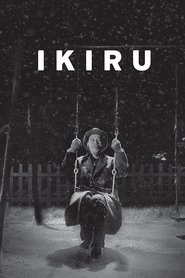
生きる

Cast
志村喬
Kanji Watanabe
田中春男
Sakai
金子信雄
Mitsuo, son of Kanji
左卜全
Ohara
小田切みき
Toyo
日守新一
Kimura
千秋実
Noguchi
山田巳之助
Subordinate Clerk Saito
藤原釜足
Sub-Section Chief Ono
小堀誠
Kiichi Watanabe, Kanji's Brother
中村伸郎
Deputy Mayor
渡辺篤
Patient
木村功
Intern
清水将夫
Doctor
伊藤雄之助
Novelist
南美江
The Maid
浦辺粂子
Tatsu Watanabe
三好栄子
Housewife
本間文子
Housewife
丹阿弥谷津子
Bar Hostess
菅井きん
Housewife
Kyôko Seki
Kazue Watanabe
阿部九洲男
City Assemblyman
永井智雄
Newspaperman
宮口精二
Yakuza Boss
加東大介
Yakuza
林寛
Yakuza
村上冬樹
Newspaperman
青野平義
Newspaperman
小川虎之助
Park Section Chief
瀬良明
Worker in General Affairs
千葉一郎
Policeman
谷晃
Bar Owner
小島洋々
Worker in Sewage Section
市村俊幸
Pianist
Harue Kuramoto
Dancer
Rasa Saya
Stripper
深見泰三
Baseball Spectator
Tateo Kawasaki
Civil Engineering Section Staff
勝本圭一郎
Park Division Staff
Haruko Toyama
Cabaret Woman
堺左千夫
Yakuza (uncredited)
広瀬正一
Yakuza (uncredited)
宇野晃司
Yakuza (uncredited)
出雲八重子
Housewife (uncredited)
Jirô Mitsuaki
City Hall Executive (uncredited)
Sôkichi Maki
General Manager (uncredited)
鈴木治夫
Sanitation Division Receptionist (uncredited)
Takeo Nagashima
(uncredited)
今井和雄
(uncredited)
加藤茂雄
(uncredited)
安芸津広
Infectious Diseases Section Receptionist Staff (uncredited)
Ippei Kawagoe
Road Section Receptionist (uncredited)
津田光男
City Planning Receptionist (uncredited)
榊田敬二
Land Readjustment Section Receptionist (uncredited)
熊谷卓三
Fire Department Staff (uncredited)
片桐恒男
(uncredited)
夏木順平
Patient (uncredited)
小泉博
Jazz Bar Guest (uncredited)
向井淳一郎
(uncredited)
本木荘二郎
Narrator (voice) (uncredited)
青山京子
Schoolgirl (uncredited)
Available on
Reviews


